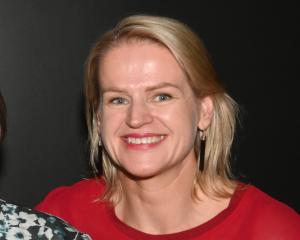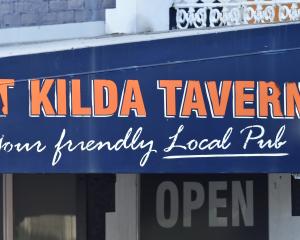He arrived from South Africa without a job, no contacts and nowhere to live but now leads a company that was once "a dog", which he helped transform into last year's top sharemarket performer.
Restaurant Brands, the franchise holder for Pizza Hut, KFC and Starbucks in New Zealand, led the NZX-50, soared 175% to $1.68 last year and is up another 31% this year, despite a 0.4% decline in the index.
The company has upgraded profit forecasts three times in the past nine months and even Pizza Hut is turning a profit.
Mr Creedy flies below the radar on the corporate scene and takes pride in sweating the small stuff.
When he walks into any of the company's restaurants, he looks at the state of the tables, for anything on the floor and mess in corners, and whether empty chairs are pushed in.
"I have a very low tolerance for anything that's out of place," the 51-year-old says.
He celebrates a middle-New Zealand lifestyle, is a science graduate with a supply chain background and has been described as a modest nuts-and-bolts guy. His timing also happens to have been impeccable.
He was appointed to the top job in 2007 when the recession was about to encourage diners to trade down to fast-food options, better opportunities were emerging on prime retail sites and labour shortages were about to abate.
Financial fallout from earlier poor decisions was steadily working its way out of the 13-year-old company and the decision to relaunch KFC was starting to pay off.
But it is his unwavering approach to reshaping the business and his attention to detail which have allowed the company to capitalise on this convergence of circumstances, and this has won the support of analysts, investors and even his workers' biggest union.
He needs a fair bit of prodding to describe what he found when he took over from Vicki Salmon three years ago.
It was a disjointed company, with a bunker mentality that had become rife, he eventually offers.
"I think people were scared. The company hadn't performed for 10 years. It was struggling; it was a dog; it was quoted as a dog; there was plenty of bad press about it," he says.
"I think everyone had a negative self-image and didn't believe that this would succeed or . . . be possible to turn around."
There was the inevitable management clean-out.
"There were some long-service people of 20 years plus who left, but the business needed that to change, and there's still some long servers left, but they're the ones who were able to adjust and adapt."
A layer of managers between the chief executive and store managers was cut, Restaurant Brands quit making its own television advertisements and supply agreements were renegotiated.
Most importantly, the emphasis on the company's star brand, KFC, was intensified.
"Change is necessary, you don't always know the true path or know 100% where you're going to end up, but you've got to back yourself. It's not wild Wild West stuff; you just talk to people, be open to change and ideas and act.
"Procrastination will kill any business, no matter how good it is."
And there is more to come, with the company looking for a trade buyer for its 41 Starbucks stores - worth an estimated $10 million to $20 million - and the progressive sale of some of its 91 Pizza Huts to owner-operators.
Mr Creedy's last big change-management job was in much different circumstances and turned out to be the catalyst for the move to New Zealand.
After working for a United States-headquartered industrial supplies firm - Air Products and Chemicals - for eight years, he became distribution manager for South African food giant Tiger Oats.
It was his job to close down warehouses in the tumultuous months around the country's first free election.
His company's trucks were routinely hijacked and it was when the death threats started that his family decided to look around for a safer place to live.
"The threat would be `We know where you live; we know where your children go to school' from radical political movements, whether from the far left or far right,"Mr Creedy said.
When he saw a mob wreck Witwatersrand University - an institution with a liberal tradition, where he studied industrial chemistry and education - Mr Creedy decided it was time to go.
"We were left with a fairly simple choice - where do they speak English and play rugby? We'd never visited anybody in New Zealand, we didn't know anyone in New Zealand but we'd read the travel brochure."
He arrived with his family on April 14, 1994, reckons he severed his support of South African rugby teams in favour of New Zealand sides the moment the plane landed and then set about finding a job and somewhere to live.
The accommodation problem was easily solved by buying a house in Blockhouse Bay, where he still lives. But finding jobs for himself and wife Linda, also an industrial chemist, proved tougher.
Mr Creedy ended up working as distribution operations manager for Linfox Logistics for seven years before being hired by Restaurant Brands as supply chain manager in 2001.
The company's early history was a fairly typical one of over-promising and under-delivering, the disastrous foray into the pizza market in Victoria, Australia, and an ill-starred acquisition of a rival here in New Zealand.
Its share price dived after it cracked the $2.50 barrier soon after listing.
Then came the failed attempts to sell the business and a share price stuck in the doldrums.
Mr Creedy says the story of Restaurant Brands is one of struggle.
"The company had difficulties at that stage. KFC was seen as a mature brand - it wasn't growing; Pizza Hut had just taken over Eagle Boys and had all that baggage; and Starbucks was very new and wasn't making much money."
Master corporate franchiser Yum! was not happy with what was happening to its brands, KFC in particular. The Dallas-based food giant put pressure on Restaurant Brands to do something.
"I moved into a development role within a year, and we put KFC under the microscope and started reinvesting in the brand."
The Restaurant Brands board approved a $1 million flagship store at Frankton in Hamilton featuring lots of glass, open space, remodelled furniture, new colours but not much of Colonel Sanders.
While the chain's founder still features on big signs in front of new stores, he is no longer etched on windows, on all packaging or on light fittings.
"We thought there had been too many colonels in the building - it was very 1970s in terms of branding," he says.
Shiny new buildings attracted more customers and made the firm more attractive to workers.
Then came better staff training, profit-sharing schemes and since Mr Creedy took the helm, a change in attitude at the top towards the company's 4500 workers, according to a union.
Unite represents more than half of the company's workers, many of whom are on the minimum wage.
According to national secretary Matt McCarten, there is room for improvement, but the company now leads fast-food operators in its approach to staff.
"They're not pussy cats but when dealing with them at a national level, they play with a straight bat."
Mr McCarten says the battle over the right of the union to represent staff was largely over before Mr Creedy became chief executive, but he has built up a new relationship.
"He's always been forthright, [but] they don't have an ideological position with us. I find that when there's a handshake, agreements will stick - and that's not always the case."
Mr Creedy ran the Pizza Hut chain during some grim times from 2003 to 2005 as competition in the form of Dominos started to seriously eat into market share.
Pizza Hut's sales of $64.2 million are just over a-quarter of KFC's, and it finally moved back into profit in the past financial year, thanks to the closure of unprofitable stores and margin improvements.
Commentator Brian Gaynor, whose Milford Asset Management increased its stake in Restaurant Brands early last year, says simple tactics used in the Pizza Hut turnaround typify Mr Creedy's approach.
The size of a basic pizza was cut to that of the opposition - with resulting cost savings - while priced just below it.
Mr Gaynor says the decision to use voiced-over Australian and American television advertisements - which Mr Creedy says saves about $1 million a year - is another indication that he is on the right track.
"He's done a lot of very simple things and they've worked. There was a combination of a lot of things coming through at the same time, but it was a lot to do with Russel. He's very low-key; he's astute; he does the little things right."
Forsyth Barr analyst Guy Hallwright agrees: "He's been doing a really good job for them, fixing the problems in Pizza Hut, and KFC continues to go from strength to strength. He's a nuts-and-bolts guy, making the business work and doing the hard yards.
RUSSEL CREEDY
- Age: 51.
- Born: Johannesburg.
- Education: De La Salle College, Johannesburg. Compulsory military training 1977. University of Witwatersrand 1978-81 BSc industrial chemistry and high school teaching qualification. MBA from University of Witwatersrand. Family: Married to Linda with four children aged 14 to 24.
- Lives: Blockhouse Bay.
- Drives: Honda Legend.
- Interests: Running - best marathon 3hr 5min, regular 10km runs; DIY, target shooting.
- Favourite takeaway: KFC chicken.
- Career: Technical sales rep for Air Products and Chemicals, South Africa. National distribution manager for Tiger Oats food company, South Africa. Operations manager Linfox Logistics, Auckland 1994-2001. Joined Restaurant Brands in 2001, supply chain manager, KFC relaunch team, Pizza Hut manager from 2003 to 2005, appointed chief executive in 2007.












